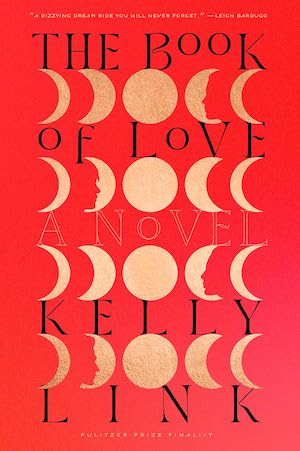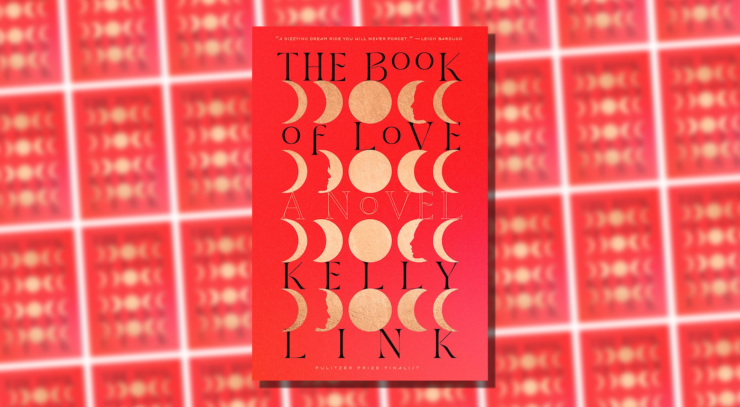I finished The Book of Love over a month ago and yet the whole, massive book continues to live, as they say, rent-free in my head. Images of tigers swirl with visions of temples rising out of the sea. I find myself thinking about asparagus and jerk-ass music-store clerks at the oddest times. But what lingers most strongly is the sense that there is still more in this book that I have not yet uncovered—something that has to be found in a second reading, or a third.
The Book of Love is, unmistakably, a Kelly Link story—full of the things that make her short work so rich, so enticing, so unforgettable. There are tangents, journeys, transformations, talking animals that are often people; there is, of course, magic (for beginners and otherwise). Magic works in all kinds of straightforward and unexplained ways, and no one is going to draw you a diagram or talk about what it costs to use said magic. In fact, it is worse if you have magic and don’t use it. You could read this as an allegory of sorts about talents or skills and the sheer magic of being alive and being able to do anything, or you could just read it as magic, incomprehensible and all-encompassing.
This book will mold itself to your mind. It is a story about teenagers who die and come back to life, and another teenager who does not die but is left behind, and some very old beings with considerable powers, a peculiar little sister, and a person who is not who they used to be. It resists summarization. There are Christmas decorations in the windows when the previously dead return, so it’s a holiday book, if you’d like, though most holiday books don’t include people becoming bits of the ocean or statues stepping down from their plinths. It’s a story about yearning and about bossy sisters and about how the internet has taught the youth things about sex that people my age most certainly did not know when we were in our late teens.
It’s a story, like so many of the best stories, about freedom and power and growing up without losing yourself; it is also a story about how sometimes when you smash your dead sister’s guitar, the splinters will really, viciously, come back to haunt you.
Buy the Book


The Book of Love
But let me start over. In a small seaside town with the not at all ominous name of Lovesend (love send, or love’s end?) we start with the one who’s still there: Susannah, who, unlike her sister Laura, has been at home for the last eleven months. Susannah and Laura were in a band with their next-door neighbor Daniel, who was sleeping with Susannah (sometimes) and generally being far too agreeable about everything (all the time). Then Laura and Daniel vanished, presumed dead, along with Mo, who was not in the band and not in the neighborhood; he lived with his grandmother, a famous Black romance novelist, up the hill a ways.
It is important that Maryanne Gorch, Mo’s grandmother, is Black; it is important that Link knows romance novels, and knows that Black romance writers were not plentiful in publishing for a long time; it is important that Maryanne Gorch spends some of her money putting up statues of Black inventors and artists and scientists all over her town. It is important that there is probably a kid like Mo in most American small towns, so often left out of the stories of those towns.
This is also a book about romance novels, and kind of a romance novel itself. Kind of. (“There are so many novels about falling in love and so few about finding a really good and rewarding job,” Link writes on this book’s second page.) It is not called The Book of Love just for funsies; it is a book steeped in love, rich with it, in layers and loops and circles and tangles. In romance novels, Susannah thinks, “attractive and imaginary people fuck. Perhaps on a horse! Behind a tapestry. On a boat. On a hill. In the past. Hail fellow kismet. Everything in the right place.” In reality, things are far more complicated.
When Laura and Daniel and Mo come back from being somewhere dark and frightening, “a blotted, attenuated, chilly nothingness,” they appear in the music room at Lewis Latimer Public School (named for the inventor of an early air conditioner and better toilets for trains). Their old music teacher, it turns out, is not just a guy who wears T-shirts with endearingly earnest slogans on them. (“When life gives you lemons say thank you. Lemons are delicious and refreshing.”)
No, Mr. Anabin, and an even more alarming being called Bogomil, are part of a compliated situation involving that other, deathly world; doors and keys; and a goddess called Malo Mogge who will turn up in Lovesend before too long. They are also connected to the fourth person who mysteriously returns from death, a person with “a voice like the scrape of an empty lighter” who decides to go by the name Bowie. Singer or knife? Up to you, but they do have different colored eyes.
Anabin and Bogomil set the returned youths a series of tasks that will determine who stays in the world of the living, and who returns to that other place. There is a magical talisman to find and protect, and there are archetypal roles that need filling. One lingering question is the matter of what happened to the three of them. If anyone knew exactly why Mo was with Laura and Daniel—he was Susannah’s friend, not theirs—it might answer some of their questions.
The situation is fraught in rich, bloody, history-spanning ways, as Link details, slowly, and with relish. But Anabin magics away any pressing questions about the months-long disappearance of the teens, inventing a cover story for friends, family, the whole town. Magic smooths everything over, makes everyone believe, except sometimes, when it does other things. Adds things to people’s lives. Creates stories where there need to be stories.
Alas, it can’t bring back the dead. Daniel’s dog is no longer with his family. And neither is Mo’s grandmother, who died while he was dead, without ever knowing what happened to him. In his grandmother’s big, cozy house is her assistant, Jenny Ping, who looks after Mo until she can’t anymore. (“His grandmother had once called Jenny the fifth rider of the apocalypse. The one who makes sure all the other riders actually go to their dental appointments.”)
In the novel form, Link gets to throw in everything she finds interesting (presumably among those things: carousels, tigers, the sea, drinking establishments with punny names, old mysteries, karaoke, towns in which you can bicycle everywhere, NICU nurses, and the foolishness of white sofas, to name a few). The arrival of the goddess Malo Mogge has the magic and the bloodshed of classic folklore, but she’s also like a Terminator in statement jewelry. Susannah and Laura, in very different ways, could be girls from other Link stories. Laura is a driven, Type-A pain in the ass, happy as a clam to use magic to make her sister wash her sheets; Susannah is more the type to take a hot customer at the coffee shop straight into the questionably hygienic bathroom, because he’s hot and they’re both young and life is short. (Don’t worry: Laura gets a bathroom tryst too.)
Life’s little ironies proliferate in these pages, as does Link’s knack for the kind of sentence that is a whole story unto itself. (A chapter called “The Book of Maryanne,” which encompasses Mo’s grandmother’s entire existence, is full of these.) Her tone is casual, knowing, wry, but with room for the enormities of magic, of eternal beings. It is a tone I could read for thousands of pages; 600-something is at once absolutely fulfilling and a mere snack.
This is the point where I feel I’m supposed to tell you what this book is “like,” in the sense of what kind of literary allusions it contains, what other writers Link reminds me of, how she fits into the literary landscape. If her protagonists have contemporaries, those might be the four main characters of Lev Grossman’s The Magicians—or who those Brakebills students might have been under very different circumstances. Link shares territory with other writers of uncategorizable tales in which magic exists and isn’t going to play by your rules (your Oyeyemis, your Benders, your Mievilles, your Valentes). But if you will forgive the grandiosity, she’s kind of the moon, here. Kelly Link makes her own tides.
This is, to get Link-referential for a moment, a faery handbag of a book. Somehow, it has a pile of plot and conflict and yet still makes me think of Le Guin’s carrier bag theory: This book simply holds so much.
In most fantastical novels, there is so little time to pause and mourn. The dead, in those stories, are gone; the living still have quests to complete. The Book of Love, though, is also a book of loss. Fresh grief, old grief, forgotten grief, and impending grief fill the pages, giving weight to Link’s punchiest lines. Not everyone can be saved, and even for the magically somewhat reincarnated, finding your own dead body is a total trip. In all its back-and-forths through the doorway between alive and not-alive, The Book of Love feels most of all like a book that wants to fit it all in, all the things that make up a life, all the tigers and karaoke jams and bloody roses and dirty sheets. When I think about this book, it seems as if I can remember everything but how it ends. Does it, really?
The Book of Love is published by Random House.










